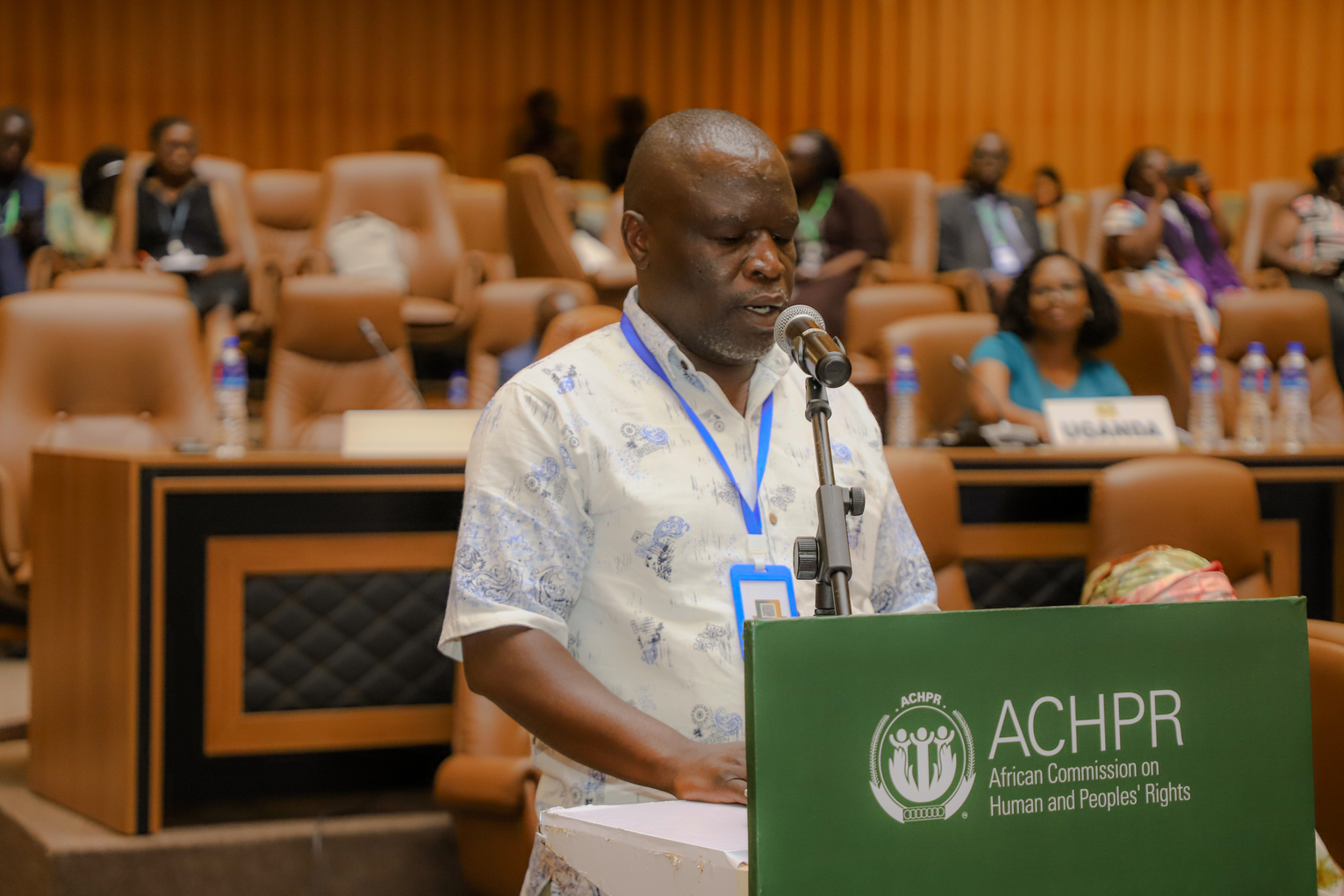Chairperson, Commissioners, distinguished delegates,
We address this Commission at a moment of a disturbing constitutional and human rights crisis in Kenya. Three years into President William Ruto's regime, the country is witnessing systematic state violence, institutional capture, and contempt for the rule of law. The President's state-of-the-nation addresses have erased the blood and pain of victims of state repression.
The regime has dismantled democratic guardrails. Parliament has been reduced to a rubber stamp, the Judiciary battered through contempt and defiance, and the Office of the Director of Public Prosecutions weaponized to persecute dissenters while shielding allies. Court orders are routinely ignored, unconstitutional bodies created, and repressive legislation rammed through a captured legislature. This has enabled attempts to extend presidential term limits and restrict fundamental freedoms.
The human toll is staggering. Between 2023 and 2025, state security forces killed more than 246 people. In July 2023 alone, 51 protesters were killed in five days during demonstrations against punitive taxation. Enforced disappearances, abductions, torture, and arbitrary arrests have become normalized. More than 1,700 protesters, including minors, have been unlawfully arrested, and 75 face trumped-up terrorism charges. Oversight bodies, including the Kenya National Commission on Human Rights, the Independent Policing Oversight Authority, the Office of the Controller of Budget, and the Office of the Auditor-General, have been systematically weakened.
We are deeply concerned by credible reports implicating Safaricom PLC, Kenya's largest telecommunications provider, and Vodafone Group PLC, in alleged systematic breaches of customers' data privacy and complicity in grave human rights violations. Investigations have revealed that Safaricom allegedly grants security agencies unfettered access to sensitive customer data, enabling state surveillance and facilitating enforced disappearances, renditions, and extrajudicial killings in Kenya. Such actions have life-and-death consequences.
Civic space is also closing fast. CIVICUS Monitor now ranks Kenya as "repressed." Journalists, human rights defenders, and content creators face arbitrary arrests, abductions, and killings. Some of the most recent alarming cases include those of Martin Mavenjina, Bob Njagi, and Nicholas Oyoo. Mavenjina, a staff member of KHRC, was illegally and extraordinarily renditioned to Uganda in June this year for his role in holding the Kenyan regime accountable for egregious human rights violations. To date, Mavenjina remains trapped in Uganda. Still, this year, Ugandan state agents abducted Njagi and Oyoo for standing in solidarity with Bobi Wine. Their whereabouts remain unknown.
This authoritarian drift is compounded by deep corruption and economic mismanagement. Billions have been lost through procurement scandals in health, agriculture, housing, and infrastructure, while ordinary Kenyans face worsening poverty, mass evictions, and crumbling essential services.
Several multinational corporations have been implicated in serious human rights violations, including assault, killings, and rape, despite Kenya being the first country to adopt a National Action Plan on Business and Human Rights. Across Kenya, communities are also being denied their fair share of natural resource revenues, with royalties owed under the Mining Act of 2016 still unpaid eight years after its enactment. Free, prior, and informed consent, as well as community development agreements, are intended to ensure meaningful consultation, participation, and equitable benefit-sharing; however, they remain largely unimplemented.
Kenya also continues to fall short of its constitutional and international obligations to protect women and minority groups, particularly gender and sexual minorities. LGBTQI+ persons remain exposed to hate, discrimination, and violence with little state protection. LGBTQI+ organizations have been unlawfully raided or denied registration, and transgender persons continue to be denied legal gender recognition despite judicial guidance.
As these violations are happening, the Kenyan regime continues to show an unwillingness to cooperate with international and regional human rights mechanisms. It has failed to extend standing invitations to Special Rapporteurs and has ignored or delayed responses to multiple requests for country visits by mandate holders covering critical areas.
We urge this Commission to hold the Kenyan state and its corporate enablers accountable and to press for strong safeguards to ensure that power and technology are not weaponized against citizens. Specifically, we make the following recommendations:
- The regime must respect and uphold the Kenyan Constitution, court orders, and all international treaties and agreements to which Kenya is a party. It must also take concrete measures to protect women and LGBTQI+ persons and end all structural discrimination.
- The Kenyan parliament must reclaim its independence and halt retrogressive laws, and the Office of the Director of Public Prosecution must end political persecution and restore prosecutorial integrity.
- The regime must ensure that oversight institutions in Kenya are insulated from political interference and adequately funded to ensure their effectiveness.
- The regime must immediately cease assault on civic space, including arrests, disappearances, and censorship, and ensure that perpetrators of state violence are held accountable, regardless of rank.
- Safaricom and Vodafone must face accountability for complicity in rights violations.
- The regime must ensure the full implementation of the Mining Act of 2016, including the timely distribution of royalties.
- The regime must extend standing invitations to Special Rapporteurs and working groups and fully cooperate with their requests for country visits.


